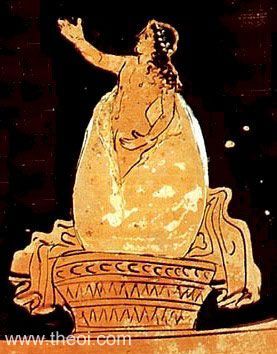Let’s start this off with an important point. Helen is of SPARTA. Not Troy.
With that said, lets move to one of the most interesting, and least talked about, aspects of Helen’s origin. The egg.

Helen is semi-divine. She is on the same level as Heracles or Perseus. Her dad is Zeus. He wasn’t human-shaped Zeus though. He seduced Helen’s mother, Leda, in the shape of a swan.
Now, biologically, I’m not sure how that worked, but to be honest, I’m not an expert in the reproductive system of swans. Either way, swan-Zeus impregnated Leda, who then laid two eggs. Now, as for who fertilised the eggs, that’s a strange one. Depending on where you look, different kids were in different eggs. Sometimes Helen and Pollux share one egg, and Clytemnestra and Castor the other. Sometimes its Helen and Clytemnestra in one and Castor and Pollux in the other. I’ve also seen one version where Helen, Castor and Pollux are in one egg and Clytemnestra…isn’t mentioned.
I realise that this is already intensely weird, however the main thing that confuses me is that Castor and Clytemnestra aren’t even Zeus’ kids. Their dad is the very human Tyndareus (Leda’s husband). Why are they in eggs?
Now, as much as I’d like to talk about Helen’s abduction by Paris, and the subsequent war, I’ve used far too much of my word count on musings about eggs. The story of the Trojan war is all too familiar to many of us, so instead I’d like to suggest something to google at 3am when you’re supposed to be asleep (I know it’s not just me that does that). According to some, Helen didn’t even go to Troy. She stayed in Egypt, and an eidolon (a kind of…cloud-Helen) was sent to Troy instead.
Part god, part swan, part human, possibly a cloud. Helen is a far deeper and more fascinating character than just being the face that launched a thousand ships.
©️ Zoe Lister
